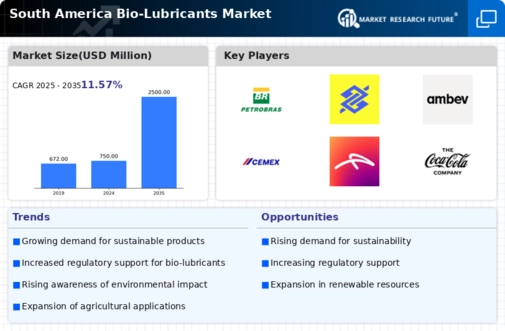Top Industry Leaders in the South America Bio-Lubricants Market

South America Bio-Lubricants Market
The South America Bio-Lubricants Market is experiencing steady growth due to increasing environmental concerns and government regulations promoting eco-friendly alternatives. Key players are focusing on research and development to improve product efficiency and expand their market presence.
Market Share Factors:
Several factors influence market share in the South American bio-lubricants market:
-
Product portfolio: Offering a diverse range of bio-lubricants catering to various applications like engine oil, hydraulic fluids, and greases strengthens a player's position. -
Brand reputation: Established brands with a strong reputation for quality and performance gain an edge in this growing market. -
Distribution network: A robust distribution network ensures efficient product reach across diverse regions and end-user industries. -
Technical expertise: Companies with strong R&D capabilities and technical expertise can develop innovative bio-lubricant solutions, setting them apart from competitors. -
Pricing strategy: Balancing competitive pricing with product value proposition is crucial to attract customers, especially in price-sensitive markets.
Competitive Strategies:
Companies in the South American bio-lubricants market employ various strategies to gain a competitive edge:
-
Product development and innovation: Players are actively investing in research and development (R&D) to formulate high-performance bio-lubricants with improved biodegradability, wear protection, and efficiency. -
Strategic partnerships and acquisitions: Collaborations with feedstock suppliers and technology providers are common, while acquisitions can help companies gain access to new markets and expertise. -
Vertical integration: Integrating production from feedstock cultivation to bio-lubricant manufacturing can optimize costs and secure supply chains. -
Sustainability initiatives: Demonstrating a commitment to sustainability through responsible sourcing, reduced environmental impact, and life cycle assessments attracts environmentally conscious customers. -
Marketing and customer education: Raising awareness about the benefits of bio-lubricants and educating customers about their performance and environmental advantages are crucial for market development.
Key Companies in the South America Bio-Lubricants Market includes.
- TENSAC
- Petronas Petroleo Brasil Ltda.
- FUCHS LUBRIFICANTES DO BRASIL LTDA
- Klüber Argentina
- BIOLUB QUÍMICA LTDA.
- TotalEnergies EP Brasil
- Shell Brasil Petróleo Ltda.
- ExxonMobil Paulínia
- Castrol Argentina
Industry News
November 2023: Klüber Lubrication, the market leader for specialty lubricants, was awarded the European Responsible Care® Award by Cefic, the European Chemical Industry Council. Klüber Lubrication was recognized in the category of "Climate Neutrality" for its project "Climate Protection by Solvent Replacement" and its Climate Action Plan. The project involved replacing solvents with more environmentally friendly alternatives in the production process, resulting in a significant reduction in greenhouse gas emissions.
December 202: Shell Brasil Petróleo Ltda. (Shell Brasil), a subsidiary of Shell plc, has announced the start of production of the FPSO Sepetiba, also known as Mero-2, in the Mero field offshore Santos Basin in Brazil. The FPSO Sepetiba has an operational capacity of 12 million cubic meters of natural gas and 180,000 barrels of oil per day, making it a significant addition to Brazil's oil and gas industry.
By beginning construction of a lubricant plant in India in April 2023 three, Exxon Mobil sought to invest rising to USD 110 million. It is expected that the maximum production capacity of the plant will be limited to 149 million liters of lubricants per annum for domestic demand and for export into diverse industries such as manufacturing, steel, power and mining, construction, commercial and passenger cars.










